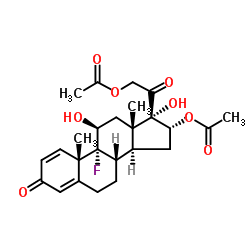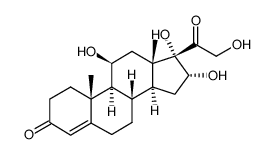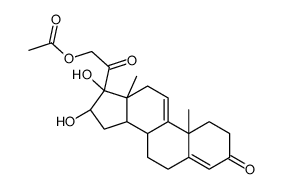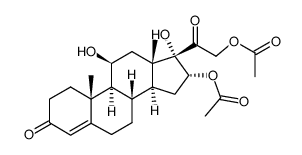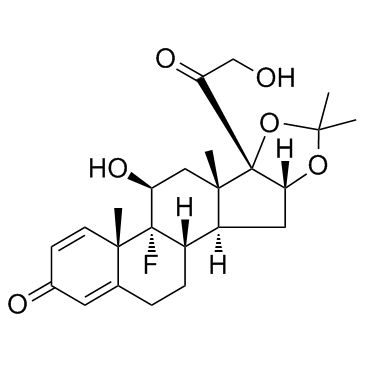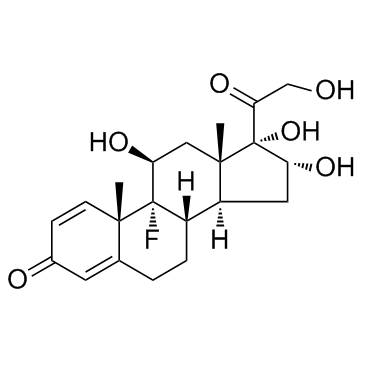67-78-7
| 中文名 | 双乙酸呋曲安奈德 |
|---|---|
| 英文名 | Triamcinolone diacetate |
| 中文别名 | 曲安西龙双醋酸酯 |
| 英文别名 |
Kenacourt
CINO-40 Triamolone 40 (11β,16α)-9-Fluoro-11,17-dihydroxy-3,20-dioxopregna-1,4-diene-16,21-diyl diacetate 21-diacetate 16a,21-Diacetoxy-9a-fluoro-11b,17a-dihydroxy-1,4-pregnadiene-3,20-dione aristocortsyrup 8357RP Tracilon Tedarol TAC-D triamcinolone 16,21-diacetate MFCD00056462 EINECS 200-669-0 (11b,16a)-16,21-Bis(acetyloxy)-9-fluoro-11,17-dihydroxypregna-1,4-diene-3,20-dione Cenacort Triamsinolone |
| 密度 | 1.4±0.1 g/cm3 |
|---|---|
| 沸点 | 608.5±55.0 °C at 760 mmHg |
| 熔点 | 19-21°C |
| 分子式 | C25H31FO8 |
| 分子量 | 478.507 |
| 闪点 | 321.8±31.5 °C |
| 精确质量 | 478.200287 |
| PSA | 127.20000 |
| LogP | 2.16 |
| 外观性状 | 白色至类白色晶体或粉末 |
| 蒸汽压 | 0.0±4.0 mmHg at 25°C |
| 折射率 | 1.573 |
| 储存条件 | 库房通风低温干燥 |
| 分子结构 | 1、 摩尔折射率:116.31 2、 摩尔体积(cm3/mol):352.9 3、 等张比容(90.2K):966.5 4、 表面张力(dyne/cm):56.2 5、 极化率(10-24cm3):46.10 |
|
Section 1. Chemical Product and Company Identification Triamcinolone diacetate Common Name/ Trade Name Triamcinolone diacetate Section 4. First Aid Measures Eye ContactCheck for and remove any contact lenses. In case of contact, immediately flush eyes with plenty of water for at
least 15 minutes. Get medical attention if irritation occurs. Skin ContactWash with soap and water. Cover the irritated skin with an emollient. Get medical attention if irritation develops. Serious Skin ContactNot available. InhalationIf inhaled, remove to fresh air. If not breathing, give artificial respiration. If breathing is difficult, give oxygen. Get medical attention. Serious InhalationNot available. IngestionDo NOT induce vomiting unless directed to do so by medical personnel. Never give anything by mouth to an unconscious person. If large quantities of this material are swallowed, call a physician immediately. Loosen tight clothing such as a collar, tie, belt or waistband. Serious IngestionNot available. Section 5. Fire and Explosion Data Flammability of the Product May be combustible at high temperature. Auto-Ignition Temperature Not available. Flash PointsNot available. Flammable LimitsNot available. Products of CombustionThese products are carbon oxides (CO, CO2), halogenated compounds. Fire Hazards in Presence of Slightly flammable to flammable in presence of heat. Various Substances Explosion Hazards in Presence Risks of explosion of the product in presence of mechanical impact: Not available. Risks of explosion of the product in presence of static discharge: Not available. of Various Substances SMALL FIRE: Use DRY chemical powder. Fire Fighting Media and InstructionsLARGE FIRE: Use water spray, fog or foam. Do not use water jet. As with most organic solids, fire is possible at elevated temperatures. Special Remarks on When heated to decomposition it emits acrid smoke and toxic fumes of Fluorine. Fire Hazards Special Remarks on Explosion Fine dust dispersed in air in sufficient concentrations, and in the presence of an ignition source is a potential dust Hazardsexplosion hazard. Section 6. Accidental Release Measures Small SpillUse appropriate tools to put the spilled solid in a convenient waste disposal container. Finish cleaning by spreading water on the contaminated surface and dispose of according to local and regional authority requirements. Large SpillUse a shovel to put the material into a convenient waste disposal container. Finish cleaning by spreading water on the contaminated surface and allow to evacuate through the sanitary system. Triamcinolone diacetate Section 7. Handling and Storage PrecautionsKeep away from heat. Keep away from sources of ignition. Ground all equipment containing material. Do not breathe dust. StorageKeep container tightly closed. Keep container in a cool, well-ventilated area. Section 8. Exposure Controls/Personal Protection Engineering ControlsUse process enclosures, local exhaust ventilation, or other engineering controls to keep airborne levels below recommended exposure limits. If user operations generate dust, fume or mist, use ventilation to keep exposure to airborne contaminants below the exposure limit. Personal Protection Safety glasses. Lab coat. Dust respirator. Use a dust respirator if ventilation is inadequate and is handling of material creates visible dust clouds. Be sure to use an approved/certified respirator or equivalent. Gloves. Personal Protection in Case of Splash goggles. Full suit. Dust respirator. Boots. Gloves. A self contained breathing apparatus should be used a Large Spillto avoid inhalation of the product. Suggested protective clothing might not be sufficient; consult a specialist BEFORE handling this product. Exposure LimitsNot available. Section 9. Physical and Chemical Properties Physical state and appearance Solid. (Powdered solid. Crystalline powder.)OdorSlight. TasteNot available. Molecular Weight478.51 g/mole ColorWhite. Off-white. pH (1% soln/water)Not applicable. Boiling PointNot available. Melting Point186°C (366.8°F) - 188 C. Critical TemperatureNot available. Not available. Specific Gravity Vapor PressureNot applicable. Vapor DensityNot available. VolatilityNot available. Odor ThresholdNot available. Not available. Water/Oil Dist. Coeff. Ionicity (in Water)Not available. Not available. Dispersion Properties SolubilityInsoluble in cold water, hot water. Section 10. Stability and Reactivity Data StabilityThe product is stable. Not available. Instability Temperature Conditions of InstabilityExcess heat Incompatibility with variousNot available. substances CorrosivityNon-corrosive in presence of glass. Triamcinolone diacetate Special Remarks onNot available. Reactivity Special Remarks onNot available. Corrosivity PolymerizationWill not occur. Section 11. Toxicological Information Routes of EntryInhalation. Ingestion. Toxicity to AnimalsLD50: Not available. LC50: Not available. Chronic Effects on Humans Not available. Other Toxic Effects onSlightly hazardous in case of skin contact (irritant), of ingestion, of inhalation. Humans Special Remarks onNot available. Toxicity to Animals Special Remarks on May cause adverse reproductive effects and birth defects (teratogenic) based on animal test data Chronic Effects on Humans Special Remarks on otherAcute Potential Health Effects: Toxic Effects on HumansSkin: May cause skin irritation with itching, erythema, folliculitis, pustules, pyoderma, vesiculation, hyperesthesia. Eyes: Dust may cause eye irritation. Inhalation: Dust may cause respiratory tract irritation. Ingestion: May cause gastrointestinal tract irritation with indigestion. Ingestion as well as if orally-inhaled may cause adverse effects which may include decreased or blurred vision, frequent urination, increased thirst, loss or increase of appetite, nervousness or restlessness, and trouble sleeping, hypertension, electrolyte imbalances due to sodiuim/fluid retention, hyperglycemia and glycosuria. Note: Possible allergic reaction to material if inhaled, ingested or in contact with skin. Chronic Potential Health Effects: Possible hypersensitization, acne or other skin problems, hip or shoulder pain, fullness in face, swelling of feet or lower legs, menstrual irregularities, hirsutism, hypopigmentation, nausea, vomiting, irregular heartbeat, muscle cramps, weakness, osteoporisis, increased susceptibilitiy to infection, psychosis, and eye problems (cataracts, glaucoma with possible damage to the optic nerve). Prolonged or repeated skin contact may cause itching, allergic contact dermatitis. Medical Conditons Aggravated by Exposure: Hypersensitivity to this material or other corticosteroids; ocular herpes simples; active alcoholism; AIDS or HIV infection; heart disease or hypertension; diabetes mellitus; myasthenia gravis; impaired liver or kidney function; esophagitis; gastritis or peptic ulcer; chickenpox or measles (including recent exposure); tuberculosis; and system fungal infections. Section 12. Ecological Information Not available. Ecotoxicity BOD5 and CODNot available. Products of BiodegradationPossibly hazardous short term degradation products are not likely. However, long term degradation products may arise. Toxicity of the ProductsThe products of degradation are more toxic than the product itself. of Biodegradation Special Remarks on theNot available. Products of Biodegradation Triamcinolone diacetate Section 13. Disposal Considerations Waste DisposalWaste must be disposed of in accordance with federal, state and local environmental control regulations. Section 14. Transport Information DOT ClassificationNot a DOT controlled material (United States). Not applicable. Identification Not applicable. Special Provisions for Transport DOT (Pictograms) Section 15. Other Regulatory Information and Pictograms No products were found. Federal and State Regulations CaliforniaCalifornia prop. 65: This product contains the following ingredients for which the State of California has found to cause cancer which would require a warning under the statute: No products were found. Proposition 65 Warnings California prop. 65: This product contains the following ingredients for which the State of California has found to cause birth defects which would require a warning under the statute: No products were found. Other RegulationsEINECS: This product is on the European Inventory of Existing Commercial Chemical Substances. Other ClassificationsWHMIS (Canada) Not controlled under WHMIS (Canada). DSCL (EEC)This product is not classified according Not applicable. to the EU regulations. Health Hazard HMIS (U.S.A.)1 National Fire Protection 1 Flammability 1 Association (U.S.A.) Fire Hazard 1 0 Reactivity Health Reactivity 0 Specific hazard Personal Protection E WHMIS (Canada) (Pictograms) DSCL (Europe) (Pictograms) TDG (Canada) (Pictograms) Triamcinolone diacetate ADR (Europe) (Pictograms) Protective Equipment Gloves. Lab coat. Dust respirator. Be sure to use an approved/certified respirator or equivalent. SECTION 16 - ADDITIONAL INFORMATION N/A |
CHEMICAL IDENTIFICATION
HEALTH HAZARD DATAACUTE TOXICITY DATA
|
| 危害码 (欧洲) | Xn |
|---|---|
| 风险声明 (欧洲) | R10:Flammable. |
| 安全声明 (欧洲) | S26-S36/37/39-S45 |
| 危险品运输编码 | UN 3272 3/PG 3 |
| WGK德国 | 3 |
| 包装等级 | III |
| 危险类别 | 3 |
| 海关编码 | 29349990 |
| 上游产品 6 | |
|---|---|
| 下游产品 2 | |
| 海关编码 | 29349990 |
|---|


